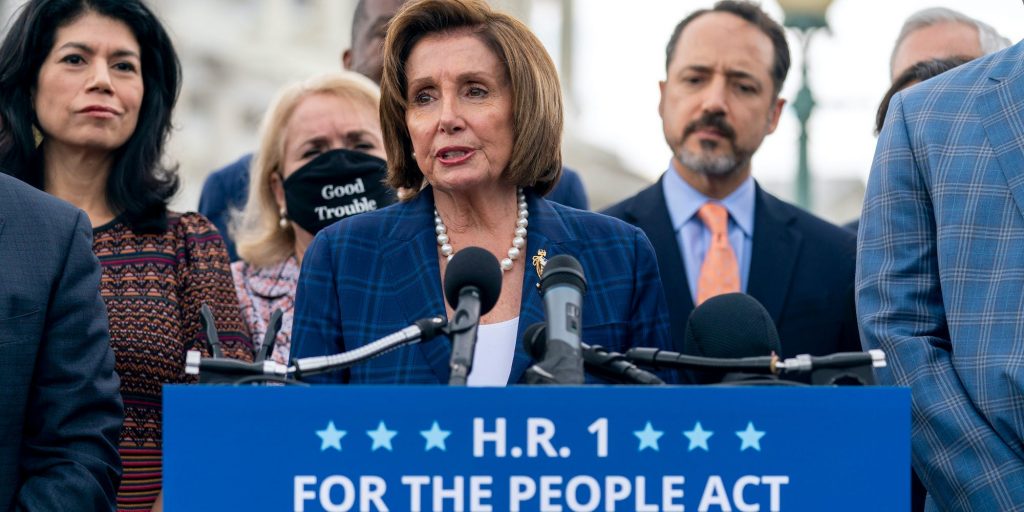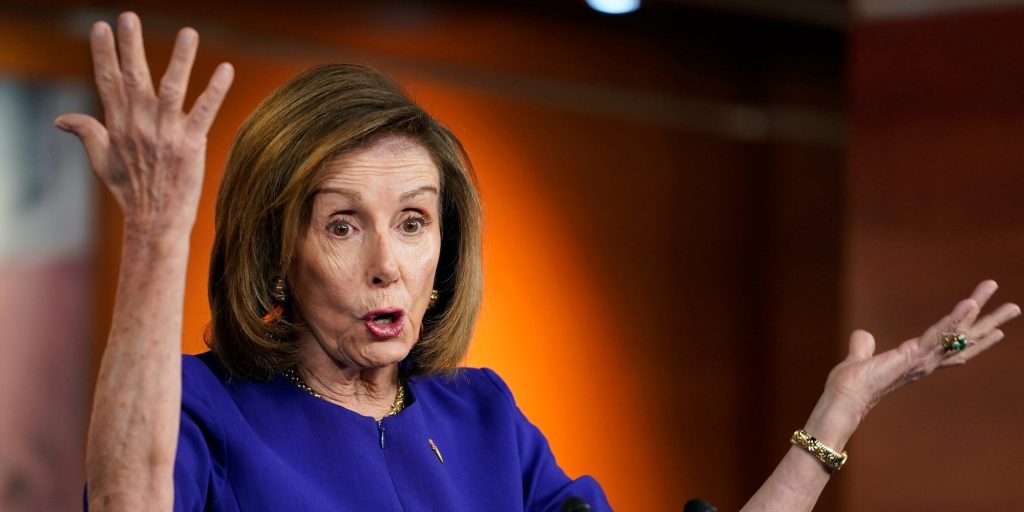- Pelosi said lawmakers should "go to the beach and forget the whole thing" if voting rights bills failed.
- A new book by two New York Times reporters details the failure of voting rights legislation.
- Pelosi clashed with the White House over the urgency to pass sweeping democracy reform measures.
House Speaker Nancy Pelosi said democracy would be so endangered without new federal voting rights laws that lawmakers should "go to the beach and forget the whole thing" if Congress didn't pass a voting rights bill, according to a forthcoming book from two New York Times reporters.
Spoiler: the bill failed, and Democrats never flocked to the beach.
When Democrats took control of the US Senate in January 2021, one of Pelosi's top priorities was to pass H.R.1, also known as the "For the People Act," — Democrats' wide-ranging voting rights and democracy reform bill.
"If the measure did not pass, then Pelosi said she believed American democracy was doomed and lawmakers might as well 'go to the beach and forget the whole thing,'" wrote authors Jonathan Martin and Alexander Burns in their forthcoming book "This Will Not Pass," which Insider obtained ahead of its May 3 release.
The mammoth-sized legislative package included sweeping new voting rights measures that would standardize the US' state-by-state patchwork voting and election laws. It also featured reforms to tighten campaign finance regulations and fortify federal ethics rules.
It seemed to have significant momentum in the aftermath of the January 6 attack on the US Capitol and outgoing President Donald Trump's continued denial of his 2020 presidential election loss.
But not everyone shared Pelosi's urgency to pass the bill — and she quickly found herself clashing with key White House advisors over what she saw as a lack of urgency and commitment to the measure.
Pelosi, the authors wrote, grew increasingly "frustrated" with the White House for not taking a more hands-on role in lobbying for the bill on Capitol Hill.
In one meeting detailed in the book, Pelosi "trashed" senior White House advisor Anita Dunn — behind Dunn's back — for doubting the necessity of the legislation, the authors wrote. When White House chief of staff Ron Klain tried to defend Dunn, Pelosi called Klain's dedication to the bill into question, too, the book says.
And "if Pelosi was incensed, Biden's advisers were equally annoyed by her attachment to the catch-all bill, especially some of the proposed campaign finance restrictions that they feared would hinder Democrats more than Republicans," the authors wrote.
The book did not specify which campaign finance reforms White House officials objected to in the bill.
But the bill included major elements of the DISCLOSE Act, a bill that would crack down on nonprofit and social welfare organizations that aren't required to disclose their donors spending so-called "dark money" to influence elections. It also called for an overhaul of the bipartisan Federal Election Commission, whose commissioners often disagree on how to enforce federal campaign finance laws.
Many Democrats have denounced the rise of "dark money" on the right. But Democrats are increasingly benefiting from "dark" and hard-to-trace campaign spending themselves. Liberal nonprofits are catching up to and, by some accounts, even exceeding "dark money" spending from conservative money in both federal and state-level elections.
And Biden, who has so far declined to take executive actions that would dramatically reshape the FEC, was "somewhat ambivalent" about the legislation's priorities.
"The president's main concern was not gerrymandering or campaign finance reform, but election subversion by foreign enemies or domestic saboteurs," the authors wrote. "Pelosi's cherished bill did nothing to address that threat."

It was Senate Majority Leader Chuck Schumer who had the far tougher hand in getting voting rights measures that drew near-nonexistent Republican support through an evenly-divided Senate under the current filibuster rules.
The authors described Schumer as "depleted" and "adrift" over the fate of voting rights as Republicans filibustered every bill he brought to the floor.
The Senate leader was tasked simultaneously with fielding discontent from donors and anger from voting rights advocates over the lack of progress while lobbying moderate Democratic Sens. Joe Manchin and Kyrsten Sinema to soften their long-held opposition to weakening the filibuster.
Manchin helped draft and got behind the Freedom to Vote Act, a slimmed-down version of H.R. 1 that focused on voting rights — and named for the late congressman John Lewis that would restore and strengthen the Voting Rights Act of 1965.
In January of 2022, Schumer brought both bills, combined into one package, to the floor — along with a plan to force a vote on filibuster reform.
But Manchin and Sinema joined all 50 Senate Republicans in voting against a one-time change to the chamber's filibuster rules that would more easily allow Democrats to pass the measures along party lines, striking the fatal blow to Democrats' voting rights push.
White House press secretary Jen Psaki, for her part, offered a far more optimistic spin on the state of American democracy than Pelosi's reported comment that lawmakers should "give up and go the beach" if voting rights and democracy reform protections didn't pass.
"My advice to everyone out there who's frustrated, sad, angry, pissed off: feel those emotions, go to a kickboxing class, have a margarita, do whatever you need to do this weekend, and then wake up on Monday morning, we gotta keep fighting," Psaki said in an interview of ABC's "The View" after the defeat of the bills.
Pelosi's office did not immediately respond to Insider's request for comment.

